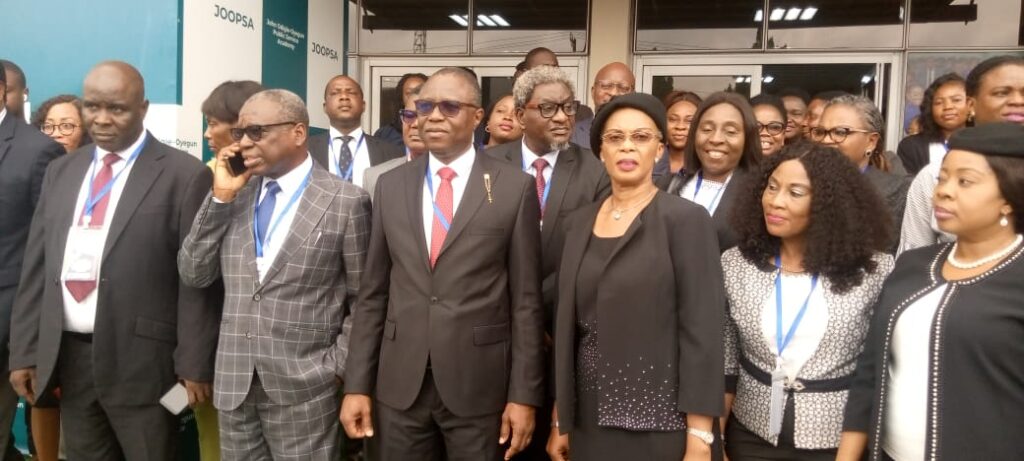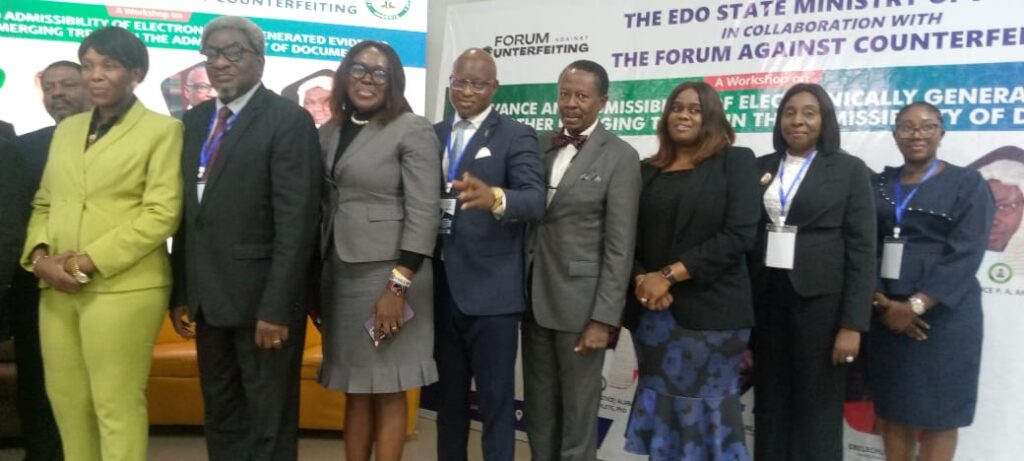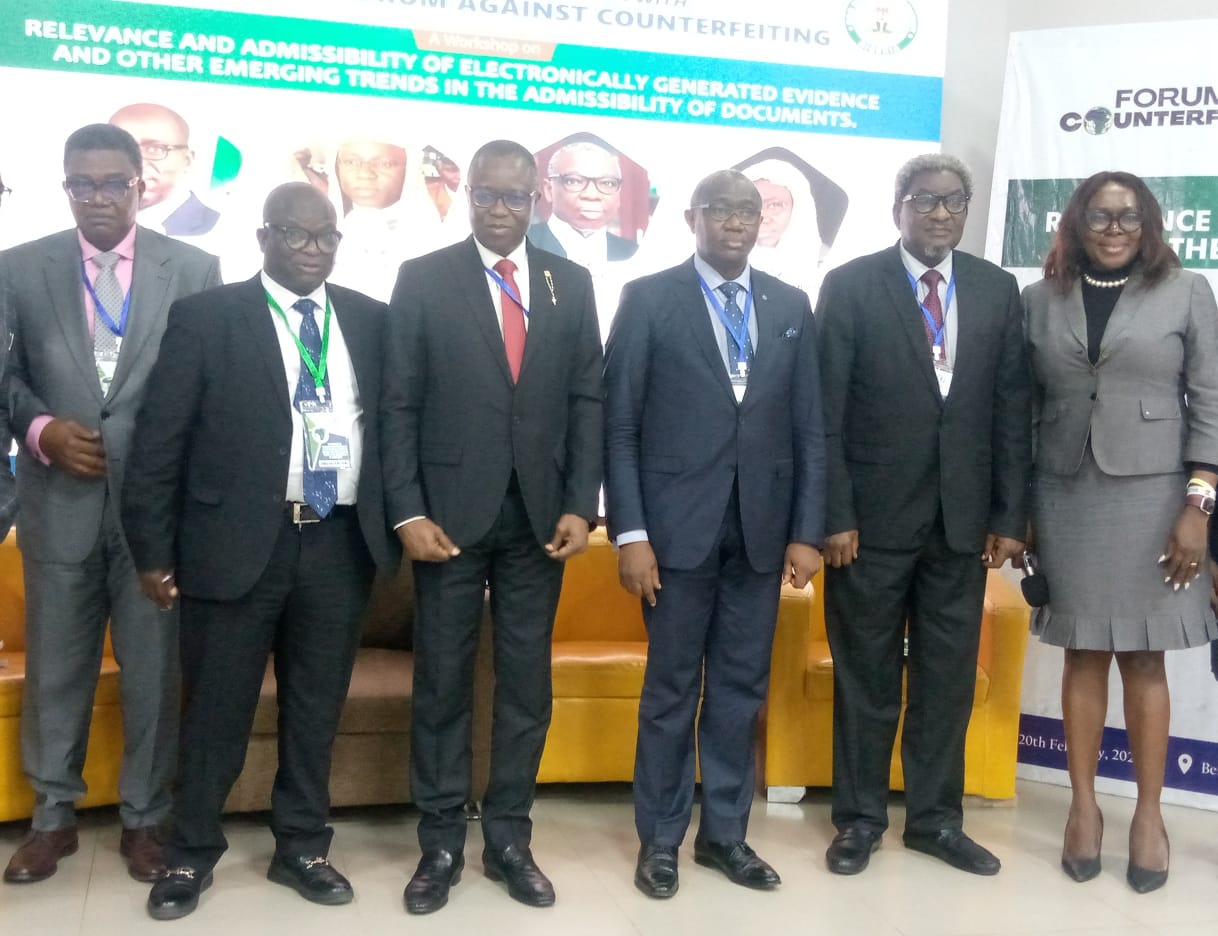
posted February 23, 2024
The Nigerian legal system seems to be adapting to the digital age, particularly in terms of the admissibility of electronically generated evidence. The focus of a workshop organized by the Edo State Ministry of Justice seems to have been a significant step in educating legal professionals about the processes and requirements for presenting such evidence in court. The amendment of Section 84 of the Evidence Act is a positive development that aligns with the need to incorporate modern technology into legal proceedings.
The approaches to evolve and deploy this emergent digital reality came to the fore last week Tuesday when the Edo State Ministry of Justice in collaboration with the Forum Against Counterfeiting organized a workshop on Relevance and Admissibility of Electronically Generated Evidence and Other Emerging Trends in the Admissibility of Documents for legal officers in the state Ministry of Justice.
In his welcome remarks, expectations and objectives of the workshop, the Edo State Attorney General and Commissioner for Justice, Oluwole Osaze Uzzi, noted that the relevance of electronically generated documents have been an issue in the Nigeria judicial system, adding that there is no time than now to look at the various issues involved.
According to him, he said it is evident from the workshop’s objectives and sessions that there’s a strong emphasis on improving legal professionals’ understanding of electronically generated evidence and its admissibility in court, noting that the presence of several Judges (both serving and retired) who have seen it all in the adjudication of matters relating thereof, is of relevance in appropriating their robust experience.

The workshop was divided into four sessions: the first dwell on the Critical Appraisal of the relevance and Admissibility of Electronically Generated Evidence under the Evidence Act, delivered by Hon. Justice Alaba Omolaye Ajileye, Phd (Rtd); the second session, on the Judicial Approach to Admissibility of Electronic Evidence and Emerging Principles/Expert Weight, by same retired Justice Ajileye.
The two papers dwell on three criteria for admissibility of electronically generated evidence namely; relevance of the document to your case, satisfying the provisions of the law and facts that must be evidence pleaded.
The retired judge gave a historical background of Electronic Evidence, which according to his began in Nigeria in 1969 when the Supreme Court then posited that “the law must not be ignorant of modern times”.
The historical background provided by Justice Ajileye underscores the importance of aligning legal practices with modern technological advancements. This shift reflects a progressive approach in the Nigerian judicial system, acknowledging the importance of adapting to the digital age.

The third session address delivered by Hon. Justice Peter Akhime Akhihiero focused on addressing the challenges and inconsistencies in the Supreme Court’s decisions regarding the admissibility of evidence, specifically related to land instruments, as captured in his paper on Judicial Approach to the Admissibility of Evidence and the Emerging Principles; Reconciling the Supreme Court’s decisions in Benjamin v. Kalio and Abdullahi v. Adetutu, delivered by Hon. Justice Peter Akhime Akhihiero, a Judge of the Edo State High Court which talked about challenges and unresolved conflicting authorities of the Superior Court in item 23 of Exclusive Legislative list that has to do with land instrument. Hence, the call for a critical examination of legal precedents and the need to establish coherent principles in such matters.
Also, Dr. Anthony Idigbe, SAN, a Senior Partner, PUNUKA Attorneys and Solicitors delivered a paper on Fundamentals of Legal Research.
Dr. Anthony Idigbe’s session paper highlights the importance of thorough research in legal practice. His “TARP” methodology appears to provide a structured approach to conducting research, emphasizing key aspects such as the subject matter, cause of action, relief sought, and the parties involved. Idigbe who spoke virtually, gave a simple methodology or approach which he tagged: “TARP”. T for the thing, subject matter, A for the cause of Action, R for Relief sought in a matter, and P for Persons or persons involved and their relationship.
The workshop also witnessed two panel discussions chaired by the Chief Judge of Edo State, Justice Daniel Okungbowa which featured discussants like Ogaga Ovrawa, SAN, former Attorney General and Commissioner for Justice, Edo State, Dr. Osagie Obayuwana among others.
Earlier in his goodwill message, the Chief Judge of Edo State, Justice Daniel Okungbowa, noted that the workshop came handy as it is in tandem with the state government’s stand to continue to upscale its judicial officer on modern tools in adjudication of justice.
Also, in his message of felicitation, Chairman, Nigeria Bar Association (NBA), Benin branch, Nosa Edo-Osagie said as the world is moving from the stone age to a digital age, the workshop remained very apt and an important topic for all, adding that the essence of the gathering was to interrogate admissibility of evidence generated electronically.
According to him, “The law has risen to the fact that we are in a digital age and so, that electronic generated piece of evidence is admissible to the extent that it is proveable. So, in essence, I can tell you that globally, the idea of tendering evidence through electronic means have come to stay.”
Overall, these sessions demonstrate a commitment to enhancing legal professionals’ skills and understanding, which is essential for ensuring effective legal practice and adherence to legal principles.

